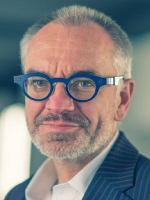Hyperpersonalized Sensing And Analytics: Contributions To A Future World Without Chronic Disease
Smart healthcare is gradually shifting its focus from symptomatic diagnostics and therapy to disease prevention and asymptomatic disease interception. While disease prevention mainly focuses on stimulating (healthy) behavior and behavior change, disease interception implies capturing a disease before the first symptoms occur and developing therapies applicable in such an early stage of the disease process. It is expected that both prevention and disease interception will need personal digital phenotyping – the use of digital and wearable technology to track health parameters and behavior over an extended period of time so as to identify risk factors and triggers.
This presentation will give an overview of imec innovations in the field of patient management, prevention and disease interception, combining hardware innovations and analytics innovations.
At imec, wearable health R&D has focused on developing highly-comfortable, medical-grade wireless solutions for the diagnosis and management of cardiovascular, neurological and cardiopulmonary disorders. We also create system- on-chip solutions that combine a wide range of on-chip electrophysiological sensor readouts with sensor fusion, powerful signal processing, memory, power management, connectivity. While providing accurate diagnosis and efficient treatment tools addresses an important need for the foreseeable future, we have set up an R&D program on prevention and disease interception which we term ‘imec.ichange’. In this R&D activity, digital phenotyping is one of the key ingredients. To achieve a lasting behavior change, we need to go beyond motivation and focus on people’s personal ability to change by providing personal triggers. This can be accomplished by accurately, unobtrusively and securely tracking a wider range of physiological parameters and by gathering contextual information on our behavior, habits, schedule, location, activity, etc. Combining detailed physiological data and detailed contextual data makes it possible to create an individual digital phenotype. This digital phenotype can then be used to give highly-personalized feedback and suggestions when you are open to act on them. Compared to the generic advice now provided by wearables, this kind of personal feedback provided at the right time is a true paradigm shift.
A specific example concerns mental stress management. Over the past 2 years, we have carried out a large-scale study where we did measured physiological stress signals, and enriched these with self-reported stress information and smartphone- based contextual information. Wearable technology has made it possible to detect
stress outside of the lab, in a real-life context. However, it also comes with new challenges in terms of data quality.
At the end of this road, our vision is to truly quantify what it means to live a healthy lifestyle and how diseases can be intercepted. It may very well take a decade or a generation to get there, but achieving this goal will have a health impact beyond our wildest dreams.
Biography
 Chris Van Hoof leads imec’s wearable health R&D across 3 imec sites (Eindhoven, Leuven and Gent). Imec’s wearable health teams provide solutions for chronic-disease patient monitoring and for preventive health through virtual coaching. Chris has taken wearable health from embryonic research to a business line serving international customers. Chris likes to make things that really work and apart from delivering industry-relevant qualified solutions to customers, his work resulted in 5 imec startups (4 in the healthcare domain). After receiving a PhD from the KU Leuven in 1992 in collaboration with imec, Chris has held positions as manager and director in diverse fields (sensors, imagers, 3D integration, MEMS, energy harvesting, body area networks, biomedical electronics, wearable health). He has published over 600 papers in journals and conference proceedings and has given more than 80 invited talks. He is full professor at the KU Leuven.
Chris Van Hoof leads imec’s wearable health R&D across 3 imec sites (Eindhoven, Leuven and Gent). Imec’s wearable health teams provide solutions for chronic-disease patient monitoring and for preventive health through virtual coaching. Chris has taken wearable health from embryonic research to a business line serving international customers. Chris likes to make things that really work and apart from delivering industry-relevant qualified solutions to customers, his work resulted in 5 imec startups (4 in the healthcare domain). After receiving a PhD from the KU Leuven in 1992 in collaboration with imec, Chris has held positions as manager and director in diverse fields (sensors, imagers, 3D integration, MEMS, energy harvesting, body area networks, biomedical electronics, wearable health). He has published over 600 papers in journals and conference proceedings and has given more than 80 invited talks. He is full professor at the KU Leuven.
